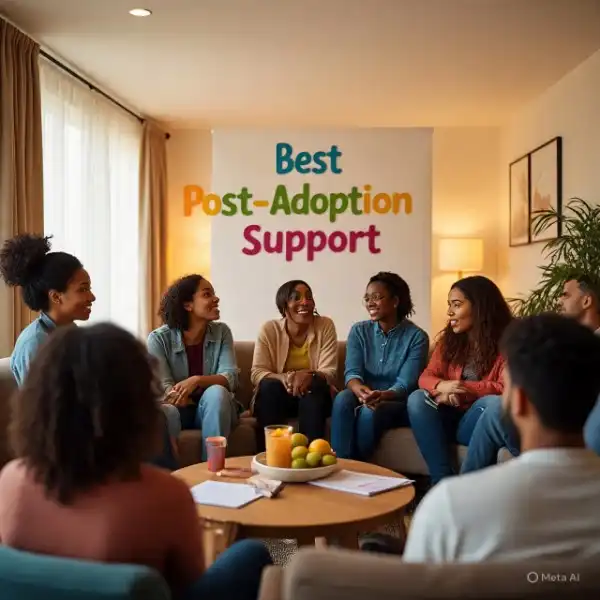Here’s The Best Post-Adoption Support For Adoptees Now

Adoption creates a connection and joy that lasts for years; however, the adoption journey continues even when the legal papers have been signed. For the adoptee, going through identity, emotional well-being, and relationships requires continuous support throughout their lives.
The adoptees are continuously faced with different unique challenges and they usually manifest at different stages of their lives. Their challenges usually include questions about their biological heritage, attachment challenges, identification issues, and complex emotions that surround their adoption story.
These are the reasons it’s important to understand the comprehensive Post-Adoption support for adoptees so it can help in their adoption journey.
Quality post-adoption support for adoptees addresses these diverse needs through specialized therapeutic services, educational advocacy, search assistance, and peer connections that provide essential guidance throughout their lifelong adoption experience.
What To Learn from this post.
- The most effective and available Post-Adoption support for adoptees.
- The easiest way to locate quality support programs for adoptees in your area.
- Best strategies to access mental health services for the adoptees.
- Effective ways to connect with support networks and adoption communities.
- Best resources for locating birth families and support for reunions.
- Educational advocacy tools and techniques that can help adoptees.
- The most effective options for financial assistance for post-adoption services.
- Understand the continuous need for support services.
Adoption usually comes with different types of challenges that can persist beyond childhood. According to the experts, adoptees usually enjoy all the dedicated Post-Adoption support, especially when it meets their needs at different stages of their lives.
These services recognize that the impact of adoption varies for individuals as they grow, from early childhood all the way into adulthood.
At different stages of their lives, the adoptees are faced with different questions they need urgent answers to, like their identity, connection to their biological families, and feelings of belonging, and these issues require professional and peer support.
The emotional rollercoaster to adoption, like grief and loss, plus the process of forming one’s identity, calls for specialized support that typical counseling might not fully address.
Good support services acknowledge the nuances and provide corresponding care.
These days, post-adoption support for adoptees comprises different services like educational advocacy, therapy, reunion, and other necessary services. These resources aim to be accessible, culturally sensitive, and adaptable to the changing needs of adoptees throughout their lives.
Specialized Therapeutic Approaches:
The Number one effective post-adoption support for adoptees is professional counseling. This is specifically designed to tackle most of the issues adoptee face, including their attachment concerns, relationship challenges, etc.
Qualified adoption-competent therapists understand the complexities of adoption trauma and can provide necessary interventions.
Psychiatric Services and Medication Management:
Another important post-adoption support for adoptees is that they have access to psychiatric services, as most of them may experience certain mental health conditions.
The compressive supports they get may include coordination with a psychiatric professional who fully understands the connections between adoption and mental health, and ensures they get the best medication they need.
Educational Advocacy and Academic Support Systems:
Due to some reasons, educational environments usually present some challenges to the adoptee. Therefore, specialized advocacy services are made available to them.
The post-adoption support for adoptees helps to ensure that they receive the necessary educational accommodations throughout, from their childhood to the highest level of education.
School-Based Support and Accommodations:
The adoptees also receive school-based support, like working with educators to build adoption-sensitive classroom environments to help address their potential triggers in curriculum content and call for individualized education plans at an appropriate time.
Educational advocates help families navigate special education services, gifted programs, and other academic support systems that may benefit adoptees.
Higher Education and Career Guidance:
Adopted students face unique hurdles when applying for college, such as how to fill out aid applications without their biological parents’ information, identity questions in academic environments, and anxiety about independence and separation from the adoptive family.
These hurdles show that the transition to different levels of education is even more stressful for adopted children.
Educator Training and Awareness Programs:
These programs bring more benefits and a better understanding of the needs of adoptees to the areas of school and the roles of personnel within. These programs, as in the previous example, do the work around adoptees’ needs and provide concrete ways to assist in their education and mastery of adoptions.
Thus, helping educators and the system work to be more welcoming and supportive for adoptees.
Search, Reunion, and Birth Family Connection Services:
Emotional and professional support is one of the most vital parts for the post-adoption support for adoptees, especially during the taking of the steps which can be described as the log, which is the support for the adoptee during reunion with the birth family, helping to find them for the first time, the steps and support which can be described as the rope.
Many adoptees center their attention on the emotional and complex aspects and find them to be the most vital, and it is very intense.
Professional Search Assistance:
We help adopters locate records, fulfill legal regulations, use DNA testing, and work with search professionals. These services, regardless of outcome, provide emotional support while setting realistic expectations.
Reunion Preparation and Mediation:
Reunion mediation and preparation services support adoptees and other relatives during first contact and subsequent interactions, when appropriate. These services enable participants to control emotional turmoil about managing expectations and navigate difficult communication during reunion experiences.
All participants can receive appropriate support if professional mediation is used.
Long-Term Reunion Support:
Long-term reunion support points out that continuous attention is needed to the relationship between adoptees and their birth relatives. Post-adoption support for adoptees includes therapy and guidance while easing the development and maintenance of these complex, evolving reunion relationships.
Networks of Peer Support and Community Development:
The adoption of other peers provides much complementary support to professional services. The construction of vicious Post Adoption Support for adoptees provides opportunities to understand and share the unique experiences of adoption. Value is given to peer support networks to help fulfill the diversity of services offered.
Facilitated Group Support Sessions:
Facilitated Group Support Sessions provide safe environments where adoptees of different ages and circumstances can freely share and discuss their issues and wins.
Focused groups of this nature may identify more specific issues under the broader topics of adoption. Member-supplied expertise and personal experience allow the sessions to remain productive and supportive.
Virtual Assistance and Online Networks
Adoption virtual networks actively provide peer post-adoption support to adoptees regardless of geographical limitations. They provide support to adoptees round-the-clock and facilitate networking between individuals with shared identities and experiences.
Mentorship and Role Model Programs:
Adoptees in these mentorship programs are paired with other adoptees and are given the necessary assistance and encouragement to promote positive behaviors. Such bonds enable younger adoptees to witness and learn how to positively overcome challenges related to their adoption. At the same time, it provides valuable community service opportunities to the adult adoptees.
Lifespan Stage Specific Support:
Any adoption support provided to the individual should first be robust and tailor-fit, and should shift to different developmental milestones. Services for the younger children largely center on fostering healthy social relationships and identity acquisition, better understanding their adoption narratives, and navigating the adoption story.

Support for Kids and Early Development:
Early intervention programs are designed to help young adoptees form secure attachments and build a healthy sense of identity. They work closely with adoptive families to foster nurturing environments that not only celebrate adoption but also tackle any early issues that might pop up during those crucial growth stages.
Teen Support and Identity Development:
These support services for teens are created to meet each adoptee’s unique challenges that come with adolescence, like identifying who they are, pursuing independence, and navigating peer pressure.
These programs guide teenage adoptees through their questions about their background while encouraging them to build healthy relationships and make important choices about their education and future.
Navigating Adult Life and Ongoing Needs:
For adult adoptees, services focus on ongoing concerns related to relationships, parenting, career choices, and aging. They recognize that adoption continues to shape people’s lives as adults and aim to provide the necessary support for managing the complexities and opportunities that arise throughout adulthood.
Childhood and Early Development Support:
Most of the adoptees have some issues as they begin to grow, however, with the early intervention services, they receive help that enables them to develop secure attachments and healthy identity concepts.
These work well with adoptive families to foster a good environment where adoptions are celebrated and early challenges that may arise as they develop are prevented.
Adolescent Identity and Independence Services:
This is also another perfect post-adoption support for adoptees as it tackles the challenge that appears in their teenage years, including their identity formation and emerging independence.
These unique interventions help them to navigate questions about their origin as they develop healthy relationships or make decisions about their life and future.
Adult Life Transitions and Ongoing Needs:
The post-adoption support for adoptees who are adults is services that help them navigate the ongoing needs of the adoptees that are related to their parenting, career, and other life decisions they have as they mature.
These services understand the fact that adoption doesn’t stop after the legal process, but continues to influence the adopted even when they become adults. They therefore, provide a way of escape for navigating these challenges and opportunities.
Major Life Change Support:
Transition support is another interesting support as it helps during major life navigations like marriage, caring for adoptive parents, and aging out of care. The support services are tailored to provide quick assistance during these important life transitions, knowing that adoption creates other challenges to these experiences.
Cultural and Identity Support Services:
The cultural aspects of post-adoption care are not left out either. The cultural connection and identity development provide a support system for those adoptees adopted across racial or cultural lines.
It helps the adoptees to explore and easily connect with their cultural identity, questions, and belonging they may have.
Cultural Education and Heritage Programs:
This provides a good environment for adoptees to understand everything they need about their heritage through language classes, community connection, etc. Cultural education programs recognize the exigency of cultural identity in overall well-being and provide a good environment for cultural exploration and connection.
Identity Counseling and Exploration:
Identity counseling support programs help the adopted whenever they have questions about their ethnic, cultural, and racial identity. It provides a safe environment for the adoptees to explore their questions about identity, while addressing other challenges related to adapting to multiple communities and navigating other cultural expectations.
Take Action: Start Your Support Journey Today:
You have seen all the available post-adoption support for adoptees I provided here, but there are so many others, so do your research well. However, if you waste time accessing these supports, you may be hindering the adoptees they love and care they desire. Begin now by researching your local adoption agencies, mental health providers, and support organizations around you
Get in touch with the national adoption organization for recommendations and check online support communities. They are the best starting point for building a support network.
Schedule to have your first consultation with an adoption-competent therapist, so they can develop a personalized support plan for you. You can also join a support group to connect with peers who understand your experiences, and remember that seeking support is a sign of strength and not weakness. Believe that the post-adoption support for adoptees can help you improve the quality of your life if you get it.
Frequently Asked Questions:
What types of professional credentials should I look for in post-adoption support providers?
Search for any licensed professional in mental health who also specializes in adoption and attachment issues. Ideal credentials include Licensed Professional Counselor (LPC), psychologist with training in adoption competencies, or Licensed Clinical Social Worker.
Verify that they participate in continuous adoption-related professional development and retain their membership in adoption-focused professional organizations.
Don’t forget to also check for specific certifications in trauma-informed care or attachment-based therapies, because it is beneficial for adoptees needing general support services.
How can adult adoptees access post-adoption support services if they were adopted decades ago?
They can access current post-adoption support for adoptees irrespective of when they were adopted. The first step is to connect with the agency that facilitated the adoption, as many of them provide life services these days.
If they are no longer in operation, contact adoption specialists in your state or department of social services for referrals.
National organizations like the American Adoption Congress can provide you with the directory for adult adoptee services.
Many therapists specialize in adult adoptee issues.
There are also online support groups that provide an immediate connection with peers. Don’t waste another minute, since adoption doesn’t prevent you from seeking support.
Are post-adoption support services covered by health insurance plans?
Yes, they are. The post-adoption support for adoptees is covered by insurance, especially when it’s provided by a licensed professional.
Personal and family therapy are all qualified for mental health benefits under most insurance plans.
Meanwhile, structured services like educational advocacy, cultural programs, or even search assistance may not be covered.
Try to verify with your insurance provider about mental health benefits and ask them about their insurance acceptance.
Most of the agencies offer financial assistance programs that can benefit you. Some employers have assisted programs for free counseling sessions, just ask and you may be amazed at what you can get.
How do I know if my child needs specialized post-adoption support services?
Some signs can show you that, including persistent questions about their biological family, difficulty forming attachments, or an inability to socialize with people.
However, switch to action immediately, it may be too late if you want to wait to see the problem before acting.
Consult with adoption-competent professionals if you see any sign of regression in behavior, or emotional dysregulation.
Trust your parental instincts and remember that seeking support proactively can prevent more serious challenges from developing later in your child’s development.






